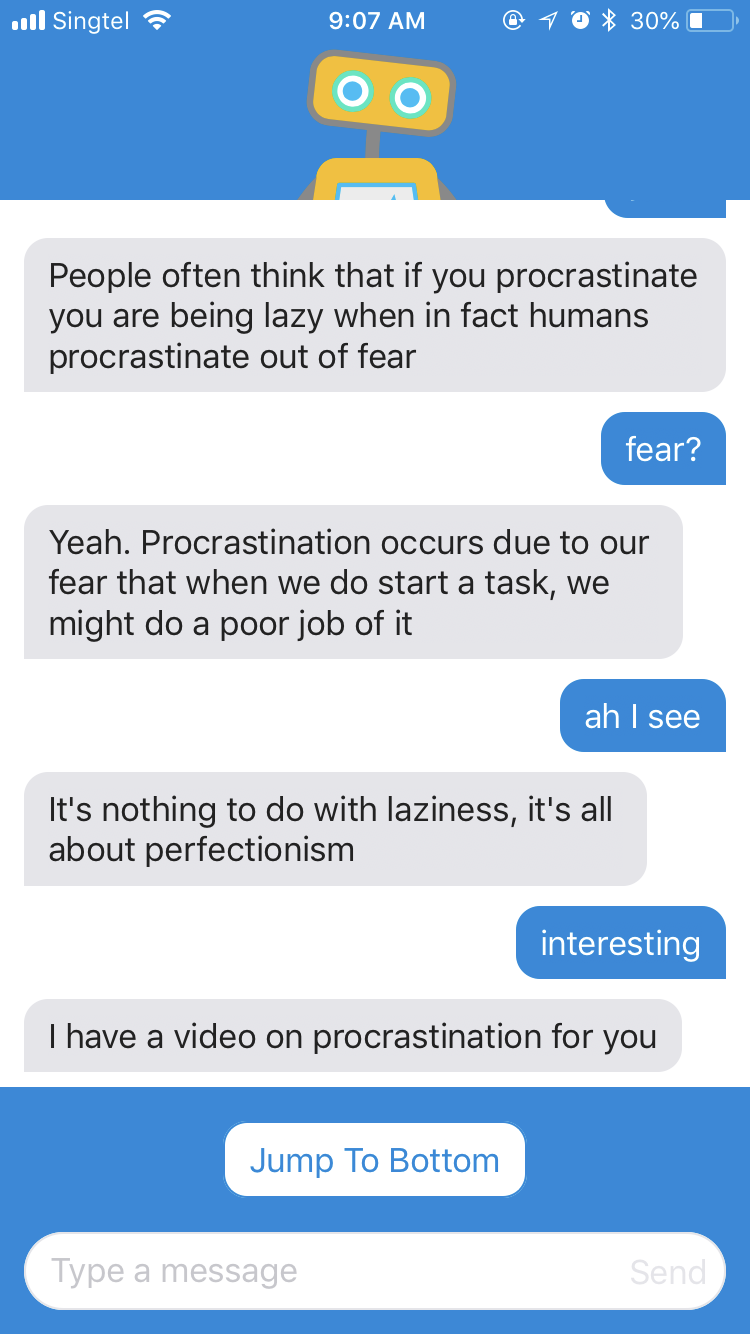From Woebot -- Procrastination
Chat with Woebot
Below are sentences extracted from the video recommended by Woebot.
The perfect distance of doing nothing is when you have the constant chance to do something.
I’m terrified that if I start, what I do would be horrible. I want things to be so amazing, and I know it cannot be, so it seems best not even to begin.
What helps me most is when occasionally, it feels like it doesn’t matter, when I feel I can mess up and that would be OK.
From my perspective, the last sentence also reveals a reason why we are not afraid of failure while playing video games. – It’s not so serious and we can start all over again.
Why Procrastinate?
Procrastination is what prevents me from doing anything that enriches, entertains myself and experienceing mind flow, thereby harms my mental health. I hate that kind of guilty and disappointment after doing nothing but staring at my smartphone.
Why does it happen all the time, then?
At first, a goal tends to be abstract. When I think about reading a book or finish a little project in the process of doing research, I could feel a lot of pressure. If the target is not specific, it would scare me, and make me feel out of control. But, once I aim at the head as well as the arms of the monster one at a time, every little victory would motivate me to do the next one.
Nevertheless, Even I’ve made tasks specific, I always want to do so many things at a time that I can’t decide which to do at this particular moment. I guess this is some kind of perfectionism, too. The solution is easy – to arrange only one task during a time period, so that I don’t have to spend amounts of time lingering between tasks.
Now that problems are getting clear, next is to tackle them.
SMART analysis
The SMART analysis gives perfect guide in the setting of objectives. Specific, Mearsurable, Achievable, Relevant, Time-bound.
Applying Specific and Time-bound to myself
-
Question-driven: While thinking about how to do research, it should be more like “try to understand how DeepWalk works and explain to Chen”, rather than “read the papers related to graph embedding” which is too unrealistic and breeds procrastination.
-
Between 10pm and 11pm, it’s time to read and write about the book I read recently or do some coding, when I belong to myself. Maybe a little jogging/walk before this.
-
After that, keep a diary, summarize what I’ve done in the day and jog down what to do tomorrow.(make use of TimeLine in google doc.)
-
Reserve 10min before sleep to meditate, if I can’t get sleep, listen to a radio instead of watching vedio(I would stay up till next morning)
Note: Achievable is of great significance for me. If I set the goal to be too hard, I would doubt myself. Subsequently finishing the task would be painful. So start doing something first, then decide on how much time I would spend on it.
